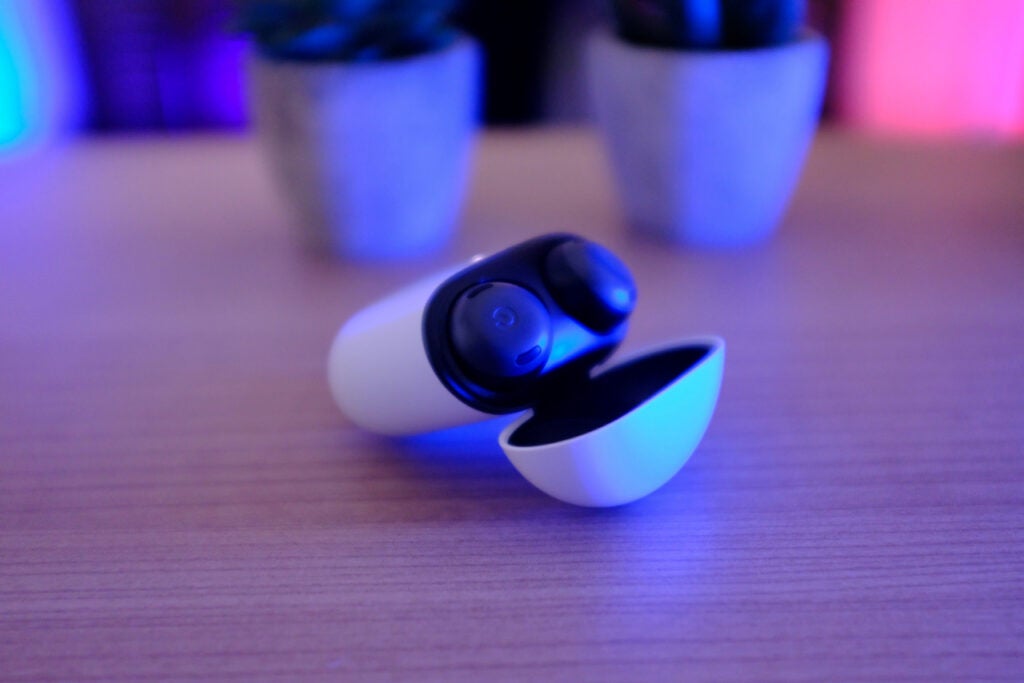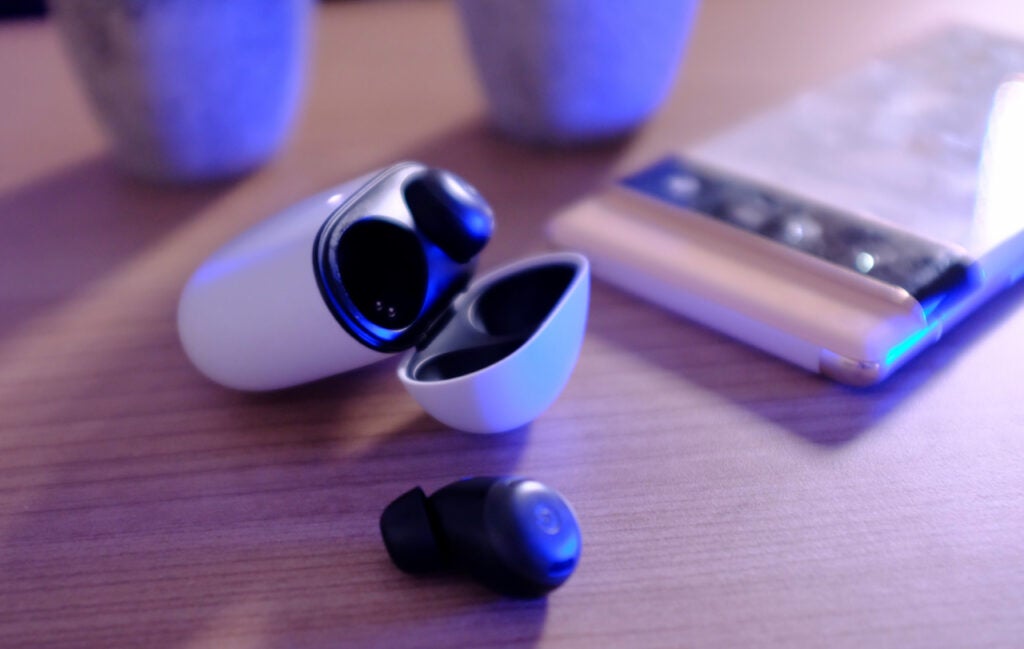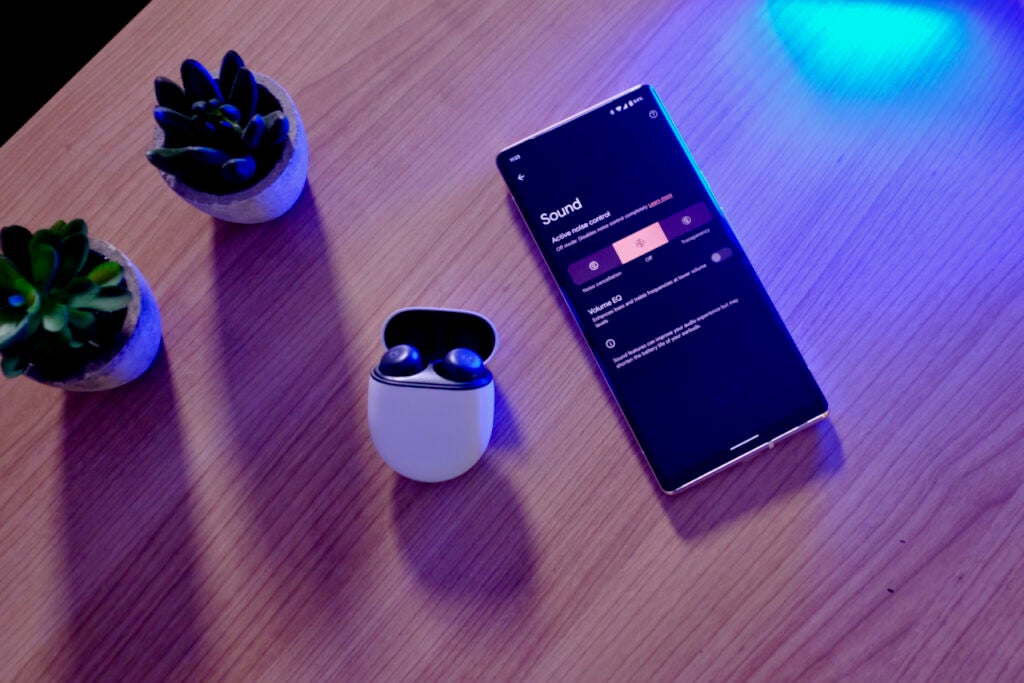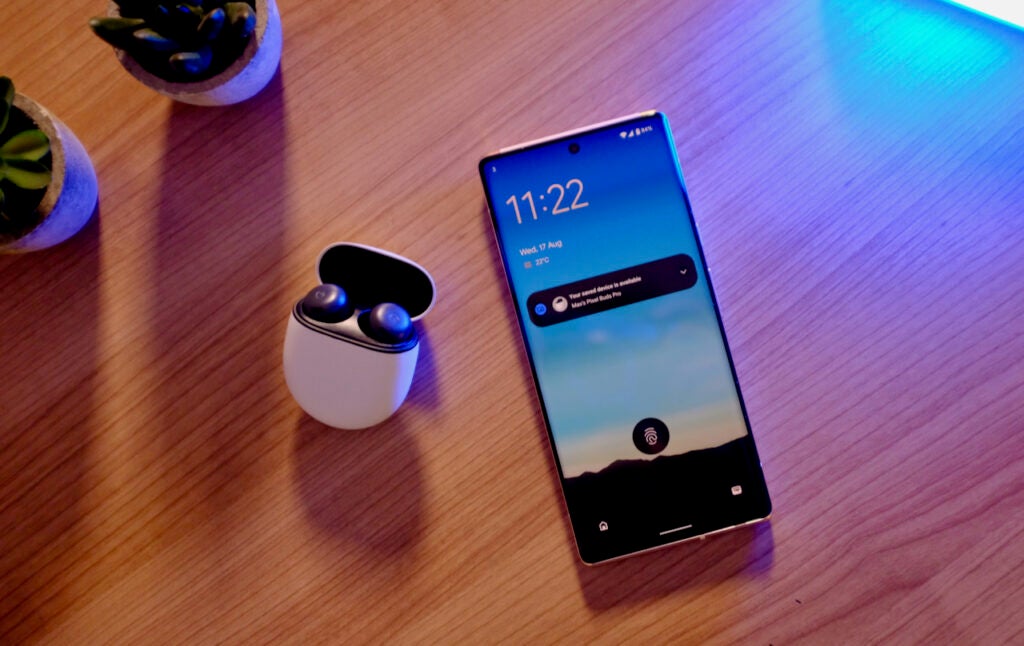Verdict
The Google Pixel Buds Pro sound good, with particular strength in bassy tracks and the ANC works well. There’s also a wealth of nice extras, like wireless charging, multipoint support and tight Android integration.
Pros
- Multiport support
- Very comfortable
- Excellent Battery Life
- Strong bass
Cons
- ANC can be a hit or miss
- Not worth it for iPhone users
- Fit isn’t for everyone
Availability
- UKRRP: £179
- USARRP: $199
- EuropeRRP: €219
- CanadaRRP: CA$259
- AustraliaRRP: AU$299
-
ANCActive noise cancellation for blocking out background sounds -
Wired and wireless chargingFast charging via a USB-C cable, or wireless charging
Introduction
After years of waiting, Google has finally launched a high-end pair of earphones that rival Apple’s AirPods Pro and Samsung Galaxy Buds Pro 2.
The Pixel Buds Pro are Google’s best true wireless buds yet, packing good sound along with excellent battery life, multi-point support (something you won’t find on Samsung’s latest pair of even the Sony WF-1000XM4s), top-tier Android integration and a design that makes them some of the comfiest buds I have ever used.
Design
- Neat design available in various colours
- Very comfortable
- IPX4 rating for the buds, IPX2 for the charging case
Google’s product design has come a long way in the past year or so. After a number of phones that lacked any design flourishes whatsoever (I am looking at you, Pixel 4a) the Pixel 6 range kickstarted a complete rethink with much more of a focus on sleek, modern design. The Pixel Buds Pro follow this.
The bean-shaped buds are small(ish) and light(ish), with a noticeable ‘G’ logo emblazoned on the outside. They’re certainly not the smallest or lightest buds around, and they feel bulky compared to the dinky Galaxy Buds Pro 2.
While my review pair come in a fairly mundane Charcoal hue, the Lemongrass (a light, tasteful green) and the brighter Coral stand out far more. These colours look great, and it’s nice to see Google offering some more imaginative options over just white or black.
The buds slip magnetically inside a case that’s larger than the one that houses the Galaxy Buds Pro 2, but a similar size to the AirPods Pro. The charging case is small enough to slip inside a front pocket and it has a nice, soft finish to it. There’s a USB-C port on the bottom for charging and a pairing button on the back.

Inside the box you’ll find three sizes of tips, all of which come housed in paper packaging. I started with the default medium tip, but moved quickly to the smaller option to aid the fit. I’ve tried a lot of truly wireless earphones this year and compared to something like the Beats Fit Pro, the fit here is on the weaker side. Even a slight shake of my head saw the buds dislodge themselves and I always felt like they could fall out when I had to sprint for the bus or reach down to pick something up in the supermarket. If you’re buying these for the gym, this could be an issue.
Google even offers what it calls a Fit Test, which is a basic setup procedure designed to ensure you’re getting the best bud fit. I tried this, Google told me I had a good seal and, well, they still felt loose to me.
While I didn’t find the fit suited my ears, there’s no doubting these are some of the comfiest earbuds around. I felt no discomfort at all wearing the Pixel Buds Pro, even for a full 7 hour rundown of the battery. This is surprising for me, as I can usually only wear AirPods for a couple of hours before my ears start to ache.
Both buds have capacitive touch pads on them for shortcuts and most of the time they work well. A long press switches between ANC modes, while Google Assistant can be summoned with this action too. My favourite addition was volume control with a short swipe across the bud – a feature missing from Apple’s AirPods range. Not having to pull out my phone to lower the volume is a massive help.

Sound Quality
- No granular control over EQ
- Very versatile sound, particular strong in bass
- Limited codec support
Google’s Pixel Buds Pro are the brand’s best sounding earbuds yet. Though considering it’s the first time it has attempted a ‘Pro’-labelled pair that probably won’t come as much of a surprise.
The sound quality here is on par with the AirPods Pro in most instances, though I still much prefer the sound from the Sony WF-1000XM4 – and Sony’s buds are usually on sale, with prices not much higher than the asking price of the Pixel Buds.
Google’s approach to audio is very similar to Apple’s. There’s very little customisation on offer here, with no in-depth EQ options for tweaking the audio to your personal preference. There is a volume EQ setting buried away in the app, but this does very little in my experience. Instead, they try to treat all music the same and perform well with whatever genre you listening to.
While performance is good across genres, bright poppy and bassy tunes sound best here to my ears. The synths at the start of Editors’ Papillon pop here with more ferocity than on Apple’s top-end headphones, giving the whole song a far more immersive feel. Though, once the other instruments start certain aspects can get lost in the higher-end, leaving things occasionally sounding muddled. The WF-1000XM4 still manage to produce clearer arrangements in this case. It’s a similar case with The Foals’ Life is Yours, with the busy arrangement sounding a little harsh.

The Pixel Buds Pro really come into their own with bass-heavy songs. The opening bars of Billie Eilish’s Bad Guy thump in a way I don’t often find on these kinds of headphones, and the clarity of the vocals still come through more so than on the Galaxy Buds Pro 2.
The quality of vocal clarity continues as McCartney screeches his way through Helter Skelter, again seriously impressing and showcasing the versatility of these buds. They also manage to deal with slower-paced, more instrumental tracks like London Grammar’s Shyer very well.
In terms of supported audio codecs, Google isn’t going after the audiophile market quite like Samsung is attempting with the 24-bit capable Galaxy Buds Pro 2. You’ll only find SBC and AAC here, with LDAC and aptX missing. I’m not convinced this is necessarily a big issue though, as for the majority of people the difference between these codecs are minimal. There’s also no spatial audio support at the time of review.
Features
- ANC and transparency modes
- Good battery life and wireless charging
- Mulitpoint support is welcome
The Pixel Buds Pro stand as Google’s first buds with active noise cancellation, and for the most part, they do a good job at cutting out background sounds.
The ANC here is very capable at blocking out those basic noises that can annoy you throughout the day. They blocked out someone in the office using an obnoxiously loud keyboard and they do a very good job cutting out voices – an even better job I would say than the AirPods Pro or Galaxy Buds Pro 2.
However, I was not all that impressed with the ANC in outside spaces, where it fell well below the AirPods Pro and Sony WF-1000XM4. The Buds Pro struggled to deafen the thud of a London Underground train and on a few occasions I have to double check whether or not ANC was even enabled. It was a similar story with loud building work or road noise.
Like the AirPods Pro, you don’t have much granular control over the ANC here. It’s either on, off or in a transparency mode that lets in background chatter so you’re not completely tuned out. Compared to Apple’s excellent transparency mode, the result here is a little weaker but it’s still useful if you want to quickly ask someone a question and don’t want to take the buds out.

Elsewhere, the Pixel Buds Pro are packed with welcome features. They pair ridiculously quickly with an Android phone; just bring the case up to your phone and you’ll be asked to connect them.
They boast multipoint support, something missing from the WF-1000XM4 and Samsung’s Galaxy Buds Pro 2, so you can connect to two devices at the same time and easily switch between the two. I connected the buds to both a Pixel 6 Pro and MacBook Pro and switching between the two depending on what was playing was impressively seamless. Oddly, this is off by default – so you’ll need to manually turn it on in the app on an Android phone.
Connectivity issues have plagued previous Google Buds, but my experience with the Pixel Buds Pro has mostly been bug free. There’s sometimes interference at busy train stations, although this is kept to a minimum and I haven’t come across any other noticeable dropouts or disconnects during my three weeks reviewing the buds.
This probably won’t come as much of a surprise, but these buds are far more useful when paired with an Android phone rather than an iPhone. While they do work fine with Apple devices, I found pairing a fiddly process and as there’s no app, you can’t tweak any settings or check the state of the ANC.
Battery life is good. The seven hours of charge per bud (11 if you turn off ANC) got me through a good portion of a workday and they last longer than both the AirPods Pro and Samsung Galaxy Buds Pro 2. However we still got better endurance from the Sony WF-1000XM4 and nearly double the juice from the fitness focussed Tribit MoveBuds H1. The case gave me two full charges and there’s both fast USB-C and Qi wireless charging to get them back to 100%.
Latest deals
Should you buy it?
You want a very comfortable pair of earbuds: Even though I had issues with the fit in my eyes, the actual comfort is miles ahead of the WF-1000XM4 and Apple’s AirPods. I could wear these buds all day without any discomfort, something I have rarely been able to do before.
You want the best ANC: While I was impressed with the ANC here in an office environment, it was less effective outdoors and struggled with louder sounds from public transport.
Final Thoughts
The Pixel Buds Pro are a worthy entrant to the wireless earbud market and a marked improvement over previous Google buds. They sound good, with particular strength in bassy tracks and the ANC works well inside. There’s also a wealth of nice extras, like wireless charging, multipoint support and tight Android integration.
I’d have liked a tighter fit and better outdoor ANC, but for the price, these are worth considering if you’re after an easy-to-use, comfortable pair of buds for an Android phone.
How we test
We test every headphones we review thoroughly over an extended period of time. We use industry standard tests to compare features properly. We’ll always tell you what we find. We never, ever, accept money to review a product.
Find out more about how we test in our ethics policy.
Tested for over three weeks
Drained the battery to determine if it lived up to claims
Listened through music streaming services including Apple Music, Spotify and Tidal
FAQs
While there’s no waterproofing, the case is rated IPX2 and the buds themselves IPX4 – the means the buds should combat sweat.
There is no charging cable included, but any USB-C cable will do the trick.
Jargon buster
ANC
ANC (Active Noise Cancellation) uses an array of microphones in a headphone to detect the frequency of the sound coming at the listener, with the ANC chip creating an inverse wave (i.e. opposing sound) to suppress any unwanted external noises.
Bluetooth
Bluetooth – named after 10th-century Danish king Harald Bluetooth who united Denmark’s tribes into a single kingdom – is a method of wireless transmission that allows for the exchange of data between devices over short distances.
AAC
AAC stands for Advanced Audio Coding and is a lossy codec used most prominently by Apple and YouTube to deliver audio quality better than SBC (Sub-Band Coding).
Google Assistant
A voice assistant which is Google’s take on Amazon’s Alexa.
Verdict
The Google Pixel Buds Pro sound good, with particular strength in bassy tracks and the ANC works well. There’s also a wealth of nice extras, like wireless charging, multipoint support and tight Android integration.
Pros
- Multiport support
- Very comfortable
- Excellent Battery Life
- Strong bass
Cons
- ANC can be a hit or miss
- Not worth it for iPhone users
- Fit isn’t for everyone
Availability
- UKRRP: £179
- USARRP: $199
- EuropeRRP: €219
- CanadaRRP: CA$259
- AustraliaRRP: AU$299
-
ANCActive noise cancellation for blocking out background sounds -
Wired and wireless chargingFast charging via a USB-C cable, or wireless charging
Introduction
After years of waiting, Google has finally launched a high-end pair of earphones that rival Apple’s AirPods Pro and Samsung Galaxy Buds Pro 2.
The Pixel Buds Pro are Google’s best true wireless buds yet, packing good sound along with excellent battery life, multi-point support (something you won’t find on Samsung’s latest pair of even the Sony WF-1000XM4s), top-tier Android integration and a design that makes them some of the comfiest buds I have ever used.
Design
- Neat design available in various colours
- Very comfortable
- IPX4 rating for the buds, IPX2 for the charging case
Google’s product design has come a long way in the past year or so. After a number of phones that lacked any design flourishes whatsoever (I am looking at you, Pixel 4a) the Pixel 6 range kickstarted a complete rethink with much more of a focus on sleek, modern design. The Pixel Buds Pro follow this.
The bean-shaped buds are small(ish) and light(ish), with a noticeable ‘G’ logo emblazoned on the outside. They’re certainly not the smallest or lightest buds around, and they feel bulky compared to the dinky Galaxy Buds Pro 2.
While my review pair come in a fairly mundane Charcoal hue, the Lemongrass (a light, tasteful green) and the brighter Coral stand out far more. These colours look great, and it’s nice to see Google offering some more imaginative options over just white or black.
The buds slip magnetically inside a case that’s larger than the one that houses the Galaxy Buds Pro 2, but a similar size to the AirPods Pro. The charging case is small enough to slip inside a front pocket and it has a nice, soft finish to it. There’s a USB-C port on the bottom for charging and a pairing button on the back.

Inside the box you’ll find three sizes of tips, all of which come housed in paper packaging. I started with the default medium tip, but moved quickly to the smaller option to aid the fit. I’ve tried a lot of truly wireless earphones this year and compared to something like the Beats Fit Pro, the fit here is on the weaker side. Even a slight shake of my head saw the buds dislodge themselves and I always felt like they could fall out when I had to sprint for the bus or reach down to pick something up in the supermarket. If you’re buying these for the gym, this could be an issue.
Google even offers what it calls a Fit Test, which is a basic setup procedure designed to ensure you’re getting the best bud fit. I tried this, Google told me I had a good seal and, well, they still felt loose to me.
While I didn’t find the fit suited my ears, there’s no doubting these are some of the comfiest earbuds around. I felt no discomfort at all wearing the Pixel Buds Pro, even for a full 7 hour rundown of the battery. This is surprising for me, as I can usually only wear AirPods for a couple of hours before my ears start to ache.
Both buds have capacitive touch pads on them for shortcuts and most of the time they work well. A long press switches between ANC modes, while Google Assistant can be summoned with this action too. My favourite addition was volume control with a short swipe across the bud – a feature missing from Apple’s AirPods range. Not having to pull out my phone to lower the volume is a massive help.

Sound Quality
- No granular control over EQ
- Very versatile sound, particular strong in bass
- Limited codec support
Google’s Pixel Buds Pro are the brand’s best sounding earbuds yet. Though considering it’s the first time it has attempted a ‘Pro’-labelled pair that probably won’t come as much of a surprise.
The sound quality here is on par with the AirPods Pro in most instances, though I still much prefer the sound from the Sony WF-1000XM4 – and Sony’s buds are usually on sale, with prices not much higher than the asking price of the Pixel Buds.
Google’s approach to audio is very similar to Apple’s. There’s very little customisation on offer here, with no in-depth EQ options for tweaking the audio to your personal preference. There is a volume EQ setting buried away in the app, but this does very little in my experience. Instead, they try to treat all music the same and perform well with whatever genre you listening to.
While performance is good across genres, bright poppy and bassy tunes sound best here to my ears. The synths at the start of Editors’ Papillon pop here with more ferocity than on Apple’s top-end headphones, giving the whole song a far more immersive feel. Though, once the other instruments start certain aspects can get lost in the higher-end, leaving things occasionally sounding muddled. The WF-1000XM4 still manage to produce clearer arrangements in this case. It’s a similar case with The Foals’ Life is Yours, with the busy arrangement sounding a little harsh.

The Pixel Buds Pro really come into their own with bass-heavy songs. The opening bars of Billie Eilish’s Bad Guy thump in a way I don’t often find on these kinds of headphones, and the clarity of the vocals still come through more so than on the Galaxy Buds Pro 2.
The quality of vocal clarity continues as McCartney screeches his way through Helter Skelter, again seriously impressing and showcasing the versatility of these buds. They also manage to deal with slower-paced, more instrumental tracks like London Grammar’s Shyer very well.
In terms of supported audio codecs, Google isn’t going after the audiophile market quite like Samsung is attempting with the 24-bit capable Galaxy Buds Pro 2. You’ll only find SBC and AAC here, with LDAC and aptX missing. I’m not convinced this is necessarily a big issue though, as for the majority of people the difference between these codecs are minimal. There’s also no spatial audio support at the time of review.
Features
- ANC and transparency modes
- Good battery life and wireless charging
- Mulitpoint support is welcome
The Pixel Buds Pro stand as Google’s first buds with active noise cancellation, and for the most part, they do a good job at cutting out background sounds.
The ANC here is very capable at blocking out those basic noises that can annoy you throughout the day. They blocked out someone in the office using an obnoxiously loud keyboard and they do a very good job cutting out voices – an even better job I would say than the AirPods Pro or Galaxy Buds Pro 2.
However, I was not all that impressed with the ANC in outside spaces, where it fell well below the AirPods Pro and Sony WF-1000XM4. The Buds Pro struggled to deafen the thud of a London Underground train and on a few occasions I have to double check whether or not ANC was even enabled. It was a similar story with loud building work or road noise.
Like the AirPods Pro, you don’t have much granular control over the ANC here. It’s either on, off or in a transparency mode that lets in background chatter so you’re not completely tuned out. Compared to Apple’s excellent transparency mode, the result here is a little weaker but it’s still useful if you want to quickly ask someone a question and don’t want to take the buds out.

Elsewhere, the Pixel Buds Pro are packed with welcome features. They pair ridiculously quickly with an Android phone; just bring the case up to your phone and you’ll be asked to connect them.
They boast multipoint support, something missing from the WF-1000XM4 and Samsung’s Galaxy Buds Pro 2, so you can connect to two devices at the same time and easily switch between the two. I connected the buds to both a Pixel 6 Pro and MacBook Pro and switching between the two depending on what was playing was impressively seamless. Oddly, this is off by default – so you’ll need to manually turn it on in the app on an Android phone.
Connectivity issues have plagued previous Google Buds, but my experience with the Pixel Buds Pro has mostly been bug free. There’s sometimes interference at busy train stations, although this is kept to a minimum and I haven’t come across any other noticeable dropouts or disconnects during my three weeks reviewing the buds.
This probably won’t come as much of a surprise, but these buds are far more useful when paired with an Android phone rather than an iPhone. While they do work fine with Apple devices, I found pairing a fiddly process and as there’s no app, you can’t tweak any settings or check the state of the ANC.
Battery life is good. The seven hours of charge per bud (11 if you turn off ANC) got me through a good portion of a workday and they last longer than both the AirPods Pro and Samsung Galaxy Buds Pro 2. However we still got better endurance from the Sony WF-1000XM4 and nearly double the juice from the fitness focussed Tribit MoveBuds H1. The case gave me two full charges and there’s both fast USB-C and Qi wireless charging to get them back to 100%.
Latest deals
Should you buy it?
You want a very comfortable pair of earbuds: Even though I had issues with the fit in my eyes, the actual comfort is miles ahead of the WF-1000XM4 and Apple’s AirPods. I could wear these buds all day without any discomfort, something I have rarely been able to do before.
You want the best ANC: While I was impressed with the ANC here in an office environment, it was less effective outdoors and struggled with louder sounds from public transport.
Final Thoughts
The Pixel Buds Pro are a worthy entrant to the wireless earbud market and a marked improvement over previous Google buds. They sound good, with particular strength in bassy tracks and the ANC works well inside. There’s also a wealth of nice extras, like wireless charging, multipoint support and tight Android integration.
I’d have liked a tighter fit and better outdoor ANC, but for the price, these are worth considering if you’re after an easy-to-use, comfortable pair of buds for an Android phone.
How we test
We test every headphones we review thoroughly over an extended period of time. We use industry standard tests to compare features properly. We’ll always tell you what we find. We never, ever, accept money to review a product.
Find out more about how we test in our ethics policy.
Tested for over three weeks
Drained the battery to determine if it lived up to claims
Listened through music streaming services including Apple Music, Spotify and Tidal
FAQs
While there’s no waterproofing, the case is rated IPX2 and the buds themselves IPX4 – the means the buds should combat sweat.
There is no charging cable included, but any USB-C cable will do the trick.
Jargon buster
ANC
ANC (Active Noise Cancellation) uses an array of microphones in a headphone to detect the frequency of the sound coming at the listener, with the ANC chip creating an inverse wave (i.e. opposing sound) to suppress any unwanted external noises.
Bluetooth
Bluetooth – named after 10th-century Danish king Harald Bluetooth who united Denmark’s tribes into a single kingdom – is a method of wireless transmission that allows for the exchange of data between devices over short distances.
AAC
AAC stands for Advanced Audio Coding and is a lossy codec used most prominently by Apple and YouTube to deliver audio quality better than SBC (Sub-Band Coding).
Google Assistant
A voice assistant which is Google’s take on Amazon’s Alexa.
























